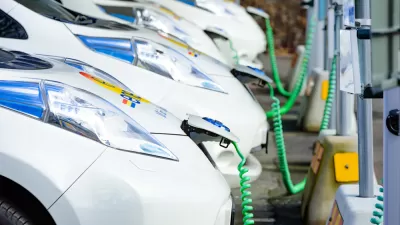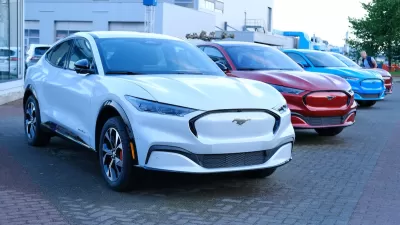$7 gas is necessary according to a new report if transportation emissions are to be reduced to EPA targets by 2020. What's more, providing tax credits for electric and hybrid vehicles would backfire. The report recommends steep gas tax increases.
To meet the EPA's 2020 targets for cutting greenhouse gas emissions by 14%, the cost of gas would have to increase to $7 a gallon, according to a March report by researchers at Harvard's Belfer Center for Science and International Affairs.
"Most of their models assumed an economy-wide carbon dioxide tax starting at $30 a ton in 2010 and escalating to $60 a ton in 2030. In some cases researchers also factored in tax credits for electric and hybrid vehicles, taxes on fuel or both.
In the modeling, it turned out that issuing tax credits could backfire, while taxes on fuel proved beneficial."
'Tax credits don't address how much people use their cars,' said Ross Morrow, one of the report's authors. 'In reverse, they can make people drive more.'
"Researchers said that vehicle miles traveled will increase by more than 30 percent between 2010 and 2030 unless policymakers increase fuel taxes."
Thanks to Ron McLinden
FULL STORY: Fuel Taxes Must Rise, Harvard Researchers Say

Maui's Vacation Rental Debate Turns Ugly
Verbal attacks, misinformation campaigns and fistfights plague a high-stakes debate to convert thousands of vacation rentals into long-term housing.

Planetizen Federal Action Tracker
A weekly monitor of how Trump’s orders and actions are impacting planners and planning in America.

San Francisco Suspends Traffic Calming Amidst Record Deaths
Citing “a challenging fiscal landscape,” the city will cease the program on the heels of 42 traffic deaths, including 24 pedestrians.

Defunct Pittsburgh Power Plant to Become Residential Tower
A decommissioned steam heat plant will be redeveloped into almost 100 affordable housing units.

Trump Prompts Restructuring of Transportation Research Board in “Unprecedented Overreach”
The TRB has eliminated more than half of its committees including those focused on climate, equity, and cities.

Amtrak Rolls Out New Orleans to Alabama “Mardi Gras” Train
The new service will operate morning and evening departures between Mobile and New Orleans.
Urban Design for Planners 1: Software Tools
This six-course series explores essential urban design concepts using open source software and equips planners with the tools they need to participate fully in the urban design process.
Planning for Universal Design
Learn the tools for implementing Universal Design in planning regulations.
Heyer Gruel & Associates PA
JM Goldson LLC
Custer County Colorado
City of Camden Redevelopment Agency
City of Astoria
Transportation Research & Education Center (TREC) at Portland State University
Jefferson Parish Government
Camden Redevelopment Agency
City of Claremont





























